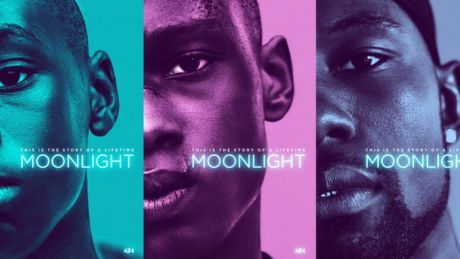Arts
You are here
Review: Moonlight

December 6, 2016
Moonlight, the second film by director Barry Jenkins, could be described as a coming of age film about a young Black boy living in Miami in the early 1980s, with a crack-addict mother and a tortured school life, where he is routinely bullied and called “fag” by his fellow students.
But the bare bones of description do no justice to the remarkable beauty and complexity that has been wrought onscreen by Jenkins and his co-writer Tarell Alvin McCraney. The screenplay for the film was based on a play by McCraney: In Moonlight Black Boys Look Blue. In an interview Jenkins talks about how personal the project was to both he and McCraney: "The movie is about very specific characters, in a very specific neighborhood, going through very specific ordeals. In that specificity there’s something universal, but also there’s a statement on the Black experience. That statement is filtered purely through my experience and Tarell’s experience. We just both happened to have been born in this neighborhood, and both our moms just happened to become addicted to crack cocaine, and we both just happened to go on and become artists."
The film is really a play in three acts—three moments in the main character, Chiron's life. In the first he is a young school boy, in the second an adolescent and in the third an adult. The three actors may not physically resemble each other, and in the case of the adult Chiron, this is actually the point (he has remade himself so he will never again be called "Little", his nickname at school), there is a tender and quiet sensibility that comes across in the performances that makes them believable as different incarnations of the same person.
So much of Chiron's character is revealed, not through what he says, since he speaks very little, but through his physical presence and his gaze. This must have been a challenge for the three actors who incarnate the different ages of Chiron: Alex Hibbert plays Chiron as a young boy, Ashton Sanders plays him as an adolescent and Trevante Rhodes as an adult.
The acting throughout is superb, including the powerful performances by the incredible Mahershala Ali as Juan, the Cuban-born drug dealer who survives and thrives (up to a point) in the poor housing projects where Chiron and his mother struggle to make it from day to day. Naomie Harris plays Paula, Chiron's mother. Harris had said at one point in her career that she would refuse to play the part of a crack addict on film, because of the stereotyping so often foisted on Black actors. However, you can see why she would have changed her mind for this part and for this film. All of the actors defy viewer expectations. They are never the stereotyped versions of their characters that can be found on innumerable TV series or bad movies. This is a movie told from the inside out and it shows.
Chiron as a young boy is befriended by Juan, who finds him hiding in an abandoned building after being chased there by schoolmates. Juan takes him home and feeds him when Chiron refuses to say where he lives, wanting to hide out, at least for a while, from his mother's erratic behaviour. The way that Juan responds when Chiron asks him what a “fag” is, an epithet he's been taunted with at school, shows empathy and understanding—behaviour which is not routinely portrayed or allowed in these kind of characters.
Moonlight is based on a play and you can definitely see that in the way it is structured. But it's also different from a play. Bringing it to the screen means it has a fluidity that would be hard to achieve on stage. In the beginning sequence where we meet Juan for the first time the camera circles around him to show his surroundings, his world, and at the same time his physical assurance and his beauty—in contrast with the way he makes a living on the mean streets of the southern Florida projects of the early 1980s.
Water and the ocean are constants in Moonlight, including a beautiful scene where Juan teaches "Little" how to swim. It shows how trust is built between these two unlikely allies. At the same time the film doesn't shy away from the contradictions of the relationship, as when Chiron quizzes Juan: “You sell drugs, right? and my Mama she does drugs?” The devastation on Juan's face tells the tale of what it means to be caught in a situation where you don't have control over what you need to do to survive, in a world that doesn't give you options.
The relationship between Chiron and his schoolmate Kevin (played chronologically by Jaden Piner, Jharrel Jerome and André Holland)—which runs throughout the three stages of his life and is a mixture of comradeship, betrayal and desire—highlights the difficulties of growing up Black and gay in the projects.
This is a film that rewards a second or third viewing because so much of what happens reverberates and echoes with the complexity and reality of what the filmmaker manages to capture on screen. The slow and sometimes dream-like camera shots, the achingly beautiful music and the integrity of Chiron and the other characters in Moonlight are a wonderful antidote to Trump America. These are the real stories of the people that Trump and his ilk want to demonize. They are a testament to the notion that Black Lives Matter and that they matter in ways that have rarely been explored on film.
Section:
Topics:










